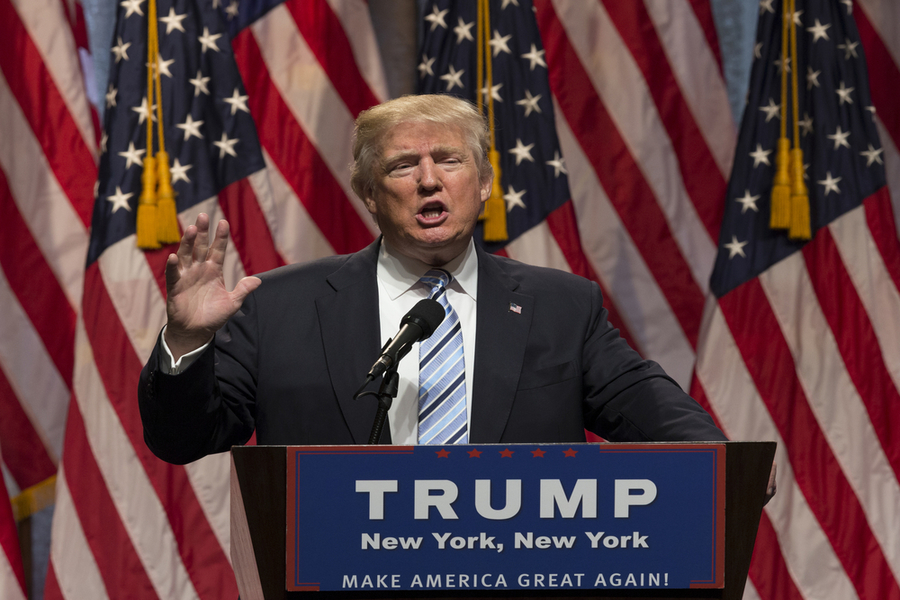The International Corner: Western Election Trends
New York, NY USA – July 16, 2016: Donald Trump speaks during introduction Governor Mike Pence as running for vice president at Hilton hotel Midtown Manhattan (Shutterstock)
Published: November 15, 2016
On Tuesday, Nov. 8th, the people of the United States elected businessman Donald Trump to be the 45th president of the United States of America. This came as a shock to almost everyone, especially pollsters, and political pundits. This was also a shock to me. I went to my watch party assuming that the United States would remain in the Democratic corner. However, it turned out that Donald Trump and his supporters were correct about a large turnout of the Republican “silent majority.” These were republicans who previously denounced Donald Trump as their choice, but when presented with two options in the voting booth, they could not support the opposite side of the political spectrum. This unwillingness to hop the aisle and the increasing use of down ballot voting demonstrates the increased political polarization in American society. While Americans are seeing this trend towards an extreme, it has already been occurring throughout the world.
There has been a large net movement towards the right, and the extreme right, of the political spectrum in most of the western world. This trend generally has been born out of extreme nationalism due to fear of outside influences, called xenophobia. The fear that foreign people will cause some sort of detriment has increased the popularity of extreme nationalism within far right parties and ideologies in various western nations. This shift began when a huge surge of migrants flooded the shores of eastern European countries. Many of these countries adopted policies that did not allow migrants to enter into their countries, and most of these were based out of actual concern over the potential fiscal burden.
Then as East Europe closed its borders to refugees, it created a ripple effect in the West. Xenophobia rapidly swept across many states in Western Europe and even the United States. In Britain, their citizens decided to leave the European Union (EU) due to a huge shift towards the extreme right-wing UK Independence Party, and one of their main warrants were increased security due to the open borders policy that exists in the EU. In countries like the Netherlands and France, there has been a gain in prominence for “Trump-like” figures. The next major Western power that may follow this trend of electing these extreme reactionaries would be France in their election next year if the French people decide to elect Marine Le Pen to Prime Minister.
The United States was not impervious to international trends, and this is evident in the outcome of the 2016 presidential election. If the current global state remains in the status quo, it is a possibility that other countries will also follow suit within the next few years.






![2025 Snowcoming Pep Assembly [Photo Gallery]](https://FHNtoday.com/wp-content/uploads/2025/03/IMG_9969-300x200.jpg)
![2025 Snowcoming Dance [Photo Gallery]](https://FHNtoday.com/wp-content/uploads/2025/03/Snowco2025-Hmartin-3-300x200.jpg)
![Girls Soccer Holds Fourth Day Of Tryouts [Photo Gallery]](https://FHNtoday.com/wp-content/uploads/2025/03/AOrozco_Soccertryouts_3.6-20-300x200.jpg)
![Baseball Holds Their Last Day of Tryouts [Photo Gallery]](https://FHNtoday.com/wp-content/uploads/2025/03/baseball-tryouts-3.7-austin-griffin-11-300x200.jpg)
![Baseball Holds Their First Day Of Tryouts [Photo Gallery]](https://FHNtoday.com/wp-content/uploads/2025/03/snocopics3.1.25-149-300x200.jpg)


